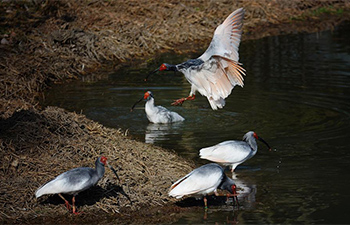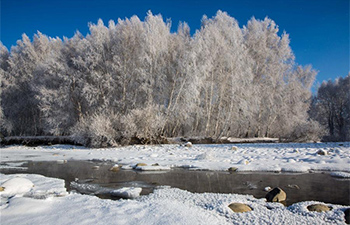
Bulgarian Prime Minister Boyko Borissov (R) shakes hands with German Chancellor Angela Merkel in Sofia, Bulgaria, on Jan. 20, 2018. Visiting German Chancellor Angela Merkel on Saturday expressed her support for Bulgaria's accession to Schengen, saying that "soon" the Balkan state could partially join the border-free area. (Xinhua/Zhan Xiaoyi)
SOFIA, Jan. 20 (Xinhua) -- Visiting German Chancellor Angela Merkel on Saturday expressed her support for Bulgaria's accession to Schengen, saying that "soon" the Balkan state could partially join the border-free area.
Bulgaria's accession to Schengen has been discussed for a long time, Merkel said while answering a question at a press conference after talks with her Bulgarian counterpart Boyko Borissov.
"We support Bulgaria, and Bulgaria to date has been guarding an external border of the European Union (EU), the Bulgarian-Turkish border," Merkel said.
Merkel said she could not say a specific date for Bulgaria's accession to Schengen.
However, in her opinion, the introduction of the rules of the Schengen Area in Bulgaria would start gradually, first at the airports, Merkel said.
This topic would come back on the agenda very soon, Merkel added.
The Schengen zone, which currently embraces 26 European countries, acknowledges the abolishment of their internal borders with other member nations and outside, for the free and unrestricted movement of people, goods, services and capital.
"There is no problem for Bulgaria to enter Schengen by air and water even today," Borissov said in turn. Borissov recalled that some time ago, the Netherlands most loudly voiced disagreement with the accession of Bulgaria and Romania to Schengen.
Dutch Prime Minister Mark Rutte would visit Bulgaria on Feb. 6, and his experts would have the opportunity to go to the border to check how Bulgaria is guarding it.
"We will provide them with full access to go wherever they want," Borissov said.
Bulgaria and Romania had hoped to join Schengen but some Schengen members such as the Netherlands and Finland have blocked their efforts expressing reluctance due to concerns over corruption and security situation in the two Balkan states.














